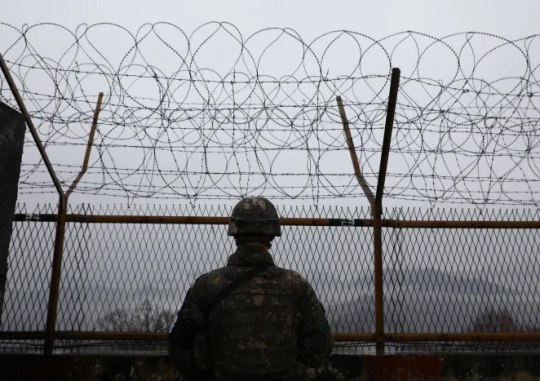Military Sexual Trauma Counselor Engages in Secondary Victimization Telling Sexual Assault Victim "If You Die, I'll Lose My Job"
이 글자크기로 변경됩니다.
(예시) 가장 빠른 뉴스가 있고 다양한 정보, 쌍방향 소통이 숨쉬는 다음뉴스를 만나보세요. 다음뉴스는 국내외 주요이슈와 실시간 속보, 문화생활 및 다양한 분야의 뉴스를 입체적으로 전달하고 있습니다.
[경향신문]

An allegation was raised that female soldiers who were raped and sexually harassed suffered secondary victimization from the military sexual trauma counselor during a special period set aside by the Ministry of National Defense last June for reporting incidents of sexual assault. The victims asked to be separated from the counselor in question immediately after the incidents, but the military denied their request claiming that they did not have the authority since the counselor was a civilian.
According to the coverage by the Kyunghyang Shinmun on January 12, A and B, female soldiers who were sexually assaulted by Major Gang of an Army infantry division, met with C, the military sexual trauma counselor on June 28, 2021, the day after they filed the report. According to the statement that B submitted to the Army audit agency, during the meeting C asked, “Why did you report the incident two days after it occurred, and not on the day of the incident?” B said, “I thought about it carefully and mustered up the courage to report the incident, but I felt pressed, as if he was holding me responsible.”
The victims argued that C exerted psychological pressure rather than give appropriate assistance as a counselor. On July 13, the day B was first examined by a psychiatrist at a university hospital, B asked C to accompany her since her mental state was unstable--she was having auditory hallucinations, hearing the voice of her assailant. But C refused saying, “My role (as a counselor) is to provide psychological support. It is not to provide administrative assistance.” Eventually, B sought the support of an outside activist to go see the doctor. On August 2, C said to B, who was resting to recover from the sexual assault, “You have to return to your unit quickly if you are to be selected for long term duty.” This led B to attempt suicide on August 9.
Yet this did not stop the secondary victimization. On August 20, C said to B, “If you die, I will lose my job,” and added, “We don’t have any record of your counseling, so you have to live.” On August 24, when the victims were hospitalized at the psychiatric ward, C even teased the women comparing them to “Herongi,” a drug addict in the TV drama, Prison Playbook. C said, “Your state is merong (informal Korean expression for bad or sour), so you’re Merongi, but if you get worse, you’ll become Herongi.” B said, “The counselor ridiculed us again on September 8, saying, ‘Oh, you two Merongi.’” She said, “I felt shame and humiliation.”
On September 30, B informed the Army corps commander of the secondary victimization through her parents. But the Army failed to separate the women and the counselor, and once again, B informed the brigade commander of her suffering in a letter. But the brigade commander tried to coax her suggesting, “Can’t you be forgiving and come and lead a good life in the military?” B reported C’s secondary victimization to the Army Gender Equality Center, but the military said, “The regulations are different since he is a civilian,” and refused to separate the workplaces of the victims and C. B said, “I’m bound to run into the counselor, because he lives in the same lodging outside the barracks. It’s so distressing.”
Previously in the case of the late Air Force Sergeant Lee Ye-ram last year, Sgt. Lee reported what she underwent more than 22 times to the counselor, but the Air Force never took appropriate measures. The counselor in charge of the case even left on a long leave of absence without handing the case over to his substitute.
Former counselors pointed out that it was difficult to stand on the victim’s side because the military commanders practically determined whether to extend their employment contracts. Bak, an activist who formerly worked as a gender equality counselor in the military explained, “Usually, a counselor signs a contract every year, then on the fifth year, the military decides whether to change it to a non-fixed term contract,” and said, “The commanders of the unit determine the scores when this is reviewed.” D, another former counselor said, “The Gender Equality Center and the unit where the counselor is positioned can each give fifty points, but in the case of the unit, the commander determines the score.” He added, “If a counselor actively protects the victim, he can’t survive in this system.”
Copyright © 경향신문. 무단전재 및 재배포 금지.
- “육군은 철수...우린(해병) 한다” “사단장님이 ‘하라’ 하셨다”···채 상병 사건 녹취록 공
- 성인의 ‘엄마 성 따르기’ 법원이 받아들였다…“성평등 사회 만들겠다는 취지에 응답” [플랫
- [전문] 유영재 “예의있게 헤어지고 싶다”
- 영국 찰스 3세, 케이트 왕세자빈에 명예 훈작 수여…왕실인사 중 최초
- [초선 당선인 인터뷰] 천하람 “한동훈은 긁어 본 복권…정치 리더로서 매력 없어져”
- 국민의힘 중진들 서로 “네가 해라, 비대위원장”···2주째 당 수습 첫발도 못뗐다
- 니카라과, “재정 악화” 이유로 한국 대사관 철수 통보
- ‘삼체’ 인기에 책 ‘침묵의 봄’판매량 급증··· OTT 효과 탄 ‘드라마셀러’
- 현대차, 차량 내부 20℃ 이상 낮춰주는 틴팅필름 개발…‘뙤약볕’ 파키스탄서 실증
- [단독]서울시의회, 26일 특위 열어 ‘서울 학생인권조례 폐지안’ 상정